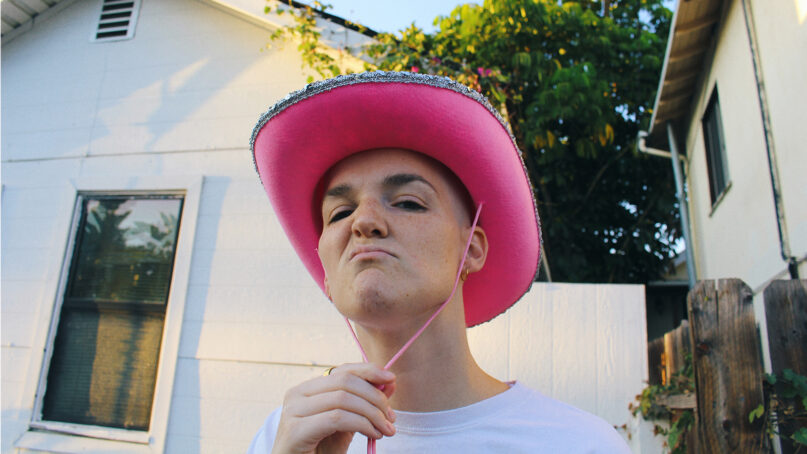(RNS) — With last month’s release of “Late Bloomer,” Christian singer-songwriter Semler has now topped Apple Music’s Christian chart twice in one year, and the EP’s “Hallelujah (In Your Arms)” is currently featured on Spotify’s Top Christian Artists playlist. It’s a song the 31-year-old Los Angeles-based artist calls an “anthem of queer joy.”
This is not your mother’s Christian contemporary music.
In a genre that has historically blacklisted musicians for coming out as gay or even asking questions about same-sex marriage, there is a revolution underway in which artists such as Semler are carving out a new niche that embraces LGBTQ identity.
Though some prominent Christian forebears have voiced support — earlier this year, Jon Foreman of Switchfoot and Amy Grant both made headlines for standing up for the LGBTQ community — the transformation is more a matter of technology than tolerance. Semler does not rely on a Christian music label or Christian radio, instead using social media and streaming platforms such as Apple Music and Spotify to bypass the traditional gatekeepers of Christian music.
Semler’s previous EP, “Preacher’s Kid,” which carried a parental advisory warning, was recorded on an at-home USB microphone.
Semler has 20,700 followers on Twitter, 38,700 on Instagram and 174,100 on TikTok. By dropping music directly on streaming apps and utilizing social media, their songs about everything from gay love to uncomfortable coffee dates with queer-condemning Christians can find their audience.
“The community has been a wide assortment of people who, for whatever reason, found themselves on the outs of the religious establishment, of organizations of faith, and yet still felt called to a relationship with God,” said Semler.
Whether those people no longer listen to Christian radio or never did, Semler insists that their music falls into the CCM category. (Semler uses any and all pronouns.)
“I think that it’s contemporary Christian music, and I’m talking about a contemporary Christian experience,” said Semler.
Not everyone would agree.
“The example of Semler going to No. 1 on Apple Music was a moot point here in Nashville especially,” said one anonymous 20-year CCM industry veteran, who said there is still “no possible way” for an openly LGBTQ person to succeed in CCM today. “I know because I work with the gatekeepers who make the decisions about who is going to play the music,” the person said.

Photo by Carolina Jacomin/Unsplash/Creative Commons
Fellow artists, too, are shy about going on the record about LGBTQ inclusion. RNS reached out to 10 Christian chart-toppers, and none responded to invitations to clarify their stance.
“The worst part is they are willing to tuck their tail between their legs and be silent and feel shame about it,” said Trey Pearson, who came out as gay in 2016, “because whether you are a Christian music rock star or music leader of a church, you know your career and your community is over the minute you are honest and vulnerable.”
RELATED: LGBTQ singer-songwriter ‘GameStops’ Christian music with No. 1 Christian album on iTunes
Chris Hauser, a CCM industry veteran with a background in radio, pointed out that radio program directors are often compelled by their employers to maintain traditional Christian perspectives on the air, even if they don’t do it out of personal belief.
“There are many Christian radio PD’s who are affirming, who have gay people in their families, but they are also acting in accordance with the company they work for, which often is a nonprofit ministry or attached to a church that has a statement of beliefs in place,” said Hauser.

Musician Grace Semler Baldridge. Courtesy photo
Semler said that the industry doesn’t oppose LGBTQ artists as much as it pretends they don’t exist. “They’ve done a really good job at just ignoring us. There’s nothing I can do to get these guys to say the words LGBTQ+,” they said, referring to the radio powerhouse K-Love. “They won’t even acknowledge that there is this community of people.”
A CCM music director confirmed that he experiences pressure from donors, listeners and top executives to avoid mention of LGBTQ inclusion altogether. Yet he knows many, himself included, who believe the silence needs to end.
“A lot of us are more passionate about finding more ways for inclusion, and we speak about it privately quite a bit,” he said.
“There are definitely days when I question, am I part of the problem?” he added. “But the goal and hope is, maybe we can slowly break down walls and boundaries and be part of the solution long-term.”
Most at risk are the artists themselves, who rely on income from merchandise, album sales and numbers of streams, not to mention concert ticket sales on a tour where churches are the venues.
Pearson’s band, Everyday Sunday, sold hundreds of thousands of records and penned chart-topping singles, but after he came out in 2016, the group’s music was quietly dropped from CCM radio stations.
Jennifer Knapp, a singer-songwriter and a Dove Award-winning CCM artist, sold more than 1.5 million albums before walking away in 2002, feeling fatigued by the genre’s theological boundaries. When she returned to music in 2010, she publicly announced that she is gay.
“I didn’t want anyone to buy a record that they would want to send back because I was gay,” said Knapp.

Jennifer Knapp. Photo courtesy of Invasion Group
But even straight artists who speak out for LGBTQ inclusion can feel a chill on their careers. Singer-songwriter Lauren Daigle drew criticism in 2018 after admitting she didn’t know what to make of homosexuality. After Dan Haseltine, the vocalist for the multi-platinum band Jars of Clay, tweeted a question about gay marriage in 2014, the group’s songs were pulled off the air.
RELATED: Switchfoot’s Jon Foreman posts video supporting LGBTQ ‘rights and freedoms’
“What many CCM artists probably believe is that every human being has value and worth, and whether or not a person’s sexual orientation is the same as theirs, it doesn’t change the way we love people,” said Haseltine. “They would probably say that in secret, but could never say it out loud. All of a sudden it changes the fantasy for the audience. That’s the addiction for them, they need someone to be morally upstanding so they don’t have to be.”
Being dismissed from mainstream CCM, some LGBTQ artists said, liberated the way they make music.
“CCM has been lacking specificity and honesty about what a walk with God looks like from the human experience,” said Semler. “It’s a lot of water metaphors, it’s a lot of ‘you are holy, no questions asked.’ When I talk to people who are figuring out their relationship with God, I’ve never heard a water metaphor in that conversation. Usually it’s something very specific, like, ‘I had a panic attack on a plane.’ So why aren’t we hearing that in songs?”

Trey Pearson. Courtesy photo
Pearson, now a solo artist, said writing for a wider audience has “opened me up to be the most creative I’ve ever been in my life.” Though his music is now more pop than Christian, his 2017 song “Hey Jesus” says: “Hey Jesus, can you hear me now, it’s been awhile since I came out. I was wonderin’ do you love me the same?”
Knapp, who now releases music through her own label, Graylin Records, said she is “a bit of an oddity in both worlds”: Many Christians are suspicious of her sexual orientation, while mainstream fans are critical of her faith background. The rise of singer-songwriters such as Julien Baker and Lucy Dacus, who address themes of queerness and religion in their music, could signal a change.
Today, more U.S. Christians than ever are affirming of LGBTQ people. A 2015 study from Pew Research found that 54% say homosexuality should be accepted. Between 2007 and 2014, Christian denominations as a whole became significantly more accepting of homosexuality. As young people continue to fuel this shift, Pearson believes, CCM will have to adapt or die out.
Haseltine hopes Semler will show artists who are afraid to speak out that while they might risk losing an audience, there’s also an audience to be gained. “There is an audience, and a group willing to support the art, (who) show up at concerts, create a movement,” he said. “They just haven’t been given the opportunity or invitation to be a fan.”
Said Semler, “For the first time in a long time, I’ve felt so excited and hopeful about what faith could look like, and about what a community of people who love Jesus could look like.”
Emily McFarlan Miller contributed to this story.





